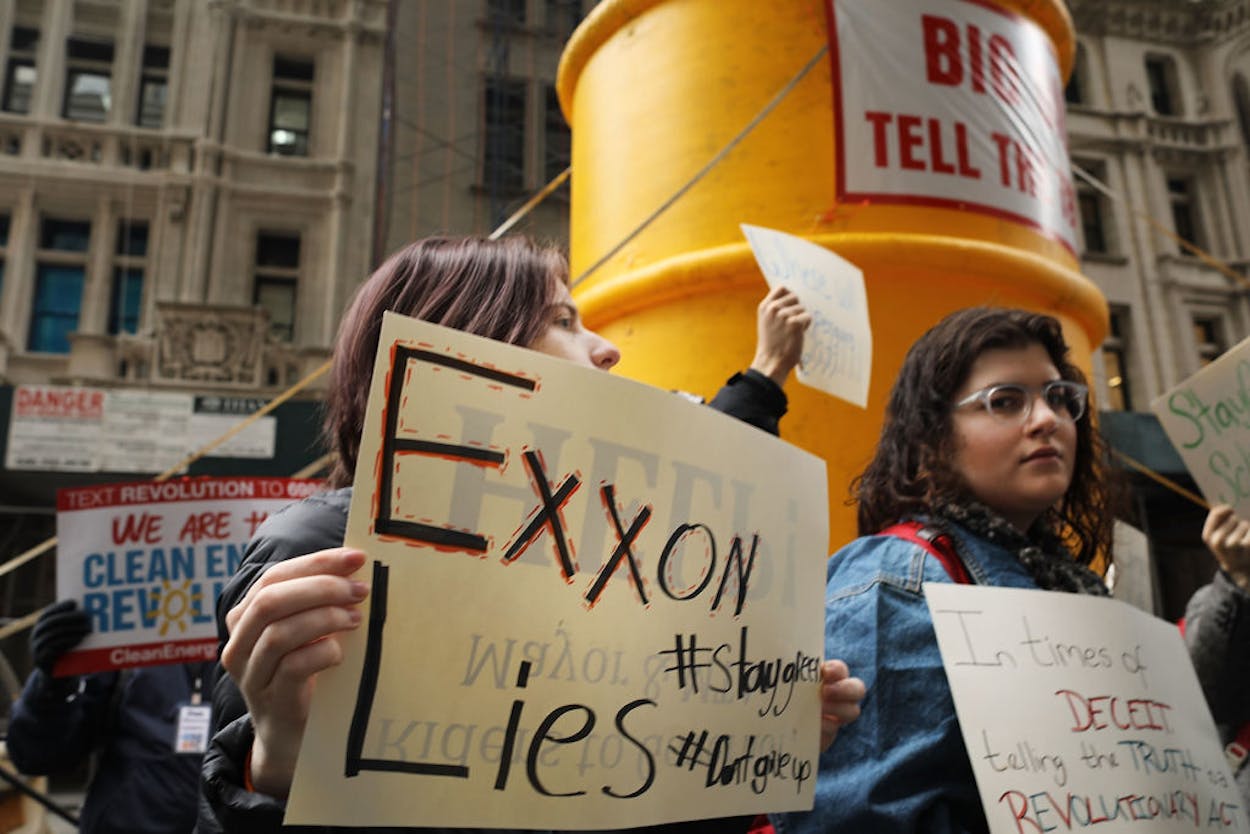Exxon suffered a major blow late last week in its attempt to stymie state investigations by attorneys general of New York and Massachusetts into the company’s alleged climate change fraud. The Dallas-based oil giant no longer has a home field advantage after a federal judge kicked the case out of Texas and over to a New York court, according to Reuters.
Last Wednesday, U.S. District Court Judge Ed Kinkeade in Dallas ruled that the case should be heard in New York rather than Texas, largely because Exxon’s argument hinges on a press conference held by New York Attorney General Eric Schneiderman last year, in which he announced that a coalition of state attorneys general focused on combatting climate change and holding the oil industry accountable. Schneiderman’s announcement came about six months after New York began investigating Exxon for supposedly misleading investors by downplaying the dangers of climate change. Massachusetts opened its own investigation shortly after that press conference. Exxon claims the press conference proved that the investigations by New York and Massachusetts “are politically motivated” and are meant to “pressure Exxon to change its position in the policy debate about climate change,” Kinkeade wrote in the transfer order. Since the press conference occurred in New York, however, Kinkeade decided it would be better if the case were heard there.
As InsideClimate News notes, this is not good news for Exxon. Kinkeade, a 2002 appointee of President George W. Bush, has been fairly sympathetic to Exxon’s case, which had been in his court for almost a year. For example, in an unprecedented move last year, Kinkeade ordered Massachusetts Attorney General Maura Healey to appear in Dallas for a deposition. But he rescinded the order shortly before Healey was scheduled to appear.
Kinkeade seemed to call into question the motivation behind the investigations into Exxon. “The Court is uncertain if it is common practice for attorneys general to begin to investigate a company after reading an article that accuses a company of possibly committing wrongdoing decades ago,” Kinkeade wrote in the transfer order. The investigations into Exxon were sparked by two media reports in 2015—similar stories in the Los Angeles Times and InsideClimate News—that exposed Exxon’s longstanding knowledge of the negative consequences of climate change, dating back to 1977.
“What the Court does know is that Exxon has publicly acknowledged since 2006 the possible significant risks to society and ecosystems from rising greenhouse gas emissions,” Kinkeade wrote. “Yet the attorneys general have only recently felt compelled to look further into Exxon’s documents from the last 40 years to see if Exxon knew more than it shared with the public and investors about climate change. Exxon offers evidence that the reason the attorneys general have chosen to act now is to achieve the goals at this time of an ‘Exxon campaign’ to coincide with the 2016 national election.”
So it seems Exxon is losing an ally in Kinkeade and gaining a far less sympathetic ear in New York U.S. District Court Judge Valerie Caproni. Within a day of being handed the case, Caproni tossed out Exxon’s lawsuit. According to InsideClimate News, the dismissal was mostly procedural so the case can be reset in New York, and Exxon is expected to refile before the April 12 deadline. But Caproni should be a tougher sell for Exxon than Kinkeade was. “I think there will the presumption by this judge that the government is acting rationally within its authority to conduct these kinds of investigations,” Pat Parenteau, a professor of environmental law at the Vermont Law School, told InsideClimate News. “She will put the burden on Exxon to show why the AGs don’t have the authority to conduct investigations, unlike Kinkeade who put the burden on the AGs to justify their investigations.”
It remains to be seen how this case will play out, but it doesn’t appear to be moving in a good direction for Exxon.






